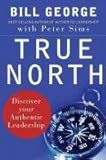 How well do you know yourself? The fourth chapter of True North: Discover Your Authentic Leadership strives to help develop self-awareness by assessing your leadership strengths, shortcomings, and development needs.
How well do you know yourself? The fourth chapter of True North: Discover Your Authentic Leadership strives to help develop self-awareness by assessing your leadership strengths, shortcomings, and development needs.
The True North exercises:
Basic Self-Awareness Assessment:
The following questions compare how others view me with my own perception. I asked several friends & colleagues to rate me. Below, my self-rating is provided, followed by the averaged score from the others. A 10 is a “very,” 5 is a “moderately,” and 1 is a “barely.”
| Question |
Self-Rating |
Feedback Rating |
| How self-confident are you? |
8 |
8.5 |
| How aware are you of your moods and emotions? |
9 |
9 |
| How effective are you in regulating your moods to minimize their impact on other people? |
8 |
9 |
| When confronted with situations that are displeasing to you, how well do you take the time to think clearly about them before responding or reacting? |
8 |
8.25 |
| When you receive critical feedback from others, how well are you able to take in the feedback and respond in a constructive manner without acting defensively? |
7 |
9.25 |
| How well do you understand the emotional makeup of others and their needs? |
9 |
9.25 |
| How sensitive are you in relating to others’ needs and helping them? |
8 |
9.25 |
| How skillful are you in building lasting relationships? |
7 |
9.5 |
| How well do you network with others and create networks of people with common interests? |
8 |
9 |
| How effective are you in leading teams? |
8 |
8.75 |
| Do others follow your lead voluntarily? |
9 |
9 |
| How persuasive are you in convincing others of your mutual interests? |
8 |
8.5 |
After reviewing the feedback, to what extent do you see yourself as others see you? How strong is your basic self-awareness right now?
I honestly thought I was being a little cocky with my self-assessment. Instead, it seems I am a little hard on myself. Just a little. To be cocky again, I would say my self-awareness is pretty darn good right now.
Strengths and Development Areas
What are your strongest capabilities or talents?
One of my strongest capabilities lies in an empathic nature that enables me to connect with others.
Way back in fifth grade, my teacher told me, “Never judge a person until you’ve walked a mile in his shoes.” That maxim stuck with me, permeating my everyday thoughts and interpersonal encounters. Every time I engage in a discussion or debate, I put myself into the other person’s shoes to understand his/her point of view.
Oddly enough, this happens so much that I sometimes find it difficult to be righteously indignant with people if I can understand why they’re being insulting or arrogant, even if I feel like I should be righteously indignant with them. Go figure.
Other capabilities and talents I consider as strengths are an analytical temperament, the ability to think critically, the comfort of making mistakes and learning from them, and the desire to constantly set and strive for long-term goals.
What are your strongest attributes as a leader?
As a leader, my empathic nature allows me to build strong relationships and inspire others. I know I’m not an expert in every field I want to be an expert in, so I’m thankful for the brillant friends I’ve made.
There’s this anecdote about Henry Ford that I like. During an interview, he told a reporter to ask him any question he wanted about his business’ operations. So the reporter asked for an obscure detail, like how many nuts and bolts go into a Model T. Ford then picked up his phone, called one of his lead engineers, and and gave the reporter the answer.
Ford’s effectiveness as a leader was not that he knew everything there was to know about his business’ operations. It was the relationships he made, the people who worked with him, and his social network. I aspire for the same kind of effectiveness.
What are your greatest needs for development as a leader?
There are situations where I am nervous and out of my element. Public speaking, approaching investors, talking to the media, and similar situations can be nerve-wracking. I’m sure I’m not alone in these. But as a leader, these are necessary skills to learn.
Toastmasters was one solution I used to use. Once my schedule clears up, I plan on finding a local chapter and continuing. The best way to approach investors, in my opinion, is to not need them, bootstrap, and build a great business. Then they’ll come to us. As for speaking to the media, well, perhaps I’ll attend a media training workshop when the time comes.
Needs
Do you need structure in your job? To what extent are you comfortable with ambiguity and change?
I love ambiguity & change, personally. Too much structure & routine bore me. My attention span at any particular role is about one year. After that, I tend to need drastic change. Before joining Yahoo! (YHOO), I stayed at companies for approximately one year. While at Yahoo, I was lucky enough to change roles & responsibilities significantly enough to keep myself engaged. My career there progressed this way: web developer -> technical manager of a small team -> technical manager of first-line managers and a larger team -> senior product manager. Each role was on a new property with a new team; each was different enough that I was always challenged. That’s the way I like it.
What level of financial security will allow you to feel comfortable?
I know how to live within my means. It is a cross between bare necessities and a handful of luxuries. To be honest, I’m fairly comfortable right now, though I will be getting married and starting a family soon, so my financial needs will be increasing.
To what extent do you need to be leading a team?
That’s a good question. I never thought about it as a need. But I sure enjoy being a leader in some way. If I won the lottery and never needed to work again, I would still start a business or non-profit venture. So perhaps I do have a need to lead.
How much time do you need with your family or loved ones each week?
Family comes first, always. I need as much time as they need me. Way back in college, I planned on entering this industry because of the ability to work from home. That meant being able to take my kids to softball games & guitar lessons, spend time with my wife, and take care of my parents if & when they need me to.
How much personal time do you need each week to recharge?
Perhaps a few hours a day. I’m not a morning person, so the first couple of hours in the morning are generally spent slowly charging up and getting ready for the day. Then at night, I like to unwind with my family or a good book. Writing also serves as a way to recharge.
Your Authentic Self
What are your vulnerabilities, blind spots, and shadow sides?
I certainly have some pet peeves. I’m impatient with impatience. I’m close-minded about close-minded people. And people who speak in absolutes absolutely bug me.
I know, I just wrote that I’m empathic and can walk in other peoples’ shoes. But I have my limits, especially if someone’s ignorance, arrogance, or obnoxiousness is directed toward someone I care about. If it is aimed at me, that’s fine. I can take it. I can even take criticism; I’m far from perfect and I know it. But leave my loved ones alone.
Admittedly, my memory isn’t as sharp anymore. To compensate, I’ve gotten into the habit of relying on digital solutions to extend my memory. This means using Google Calendar (GOOG) to manage my schedule, Gmail to manage my tasks, and my Apple iPhone (AAPL) to give me access to those tools wherever I am. It’s an efficient system, though I really need to do some brain teasers & memory games so I’m not a total moron when I’m a grandfather.
To what extent do you use defensive armor as a shield to protect yourself from exposing your vulnerabilities with others?
Everyone has defense mechanisms to protect their vulnerabilities to some extent, that’s only natural. I am a fiercely private person, if you can believe it. There are aspects of my life I will never share online, especially if they pertain to my family. But everything else is filtered appropriately. Even my online presence is part of my privacy strategy – if I can control what appears online (my personal brand, so to speak), then I can control what is seen and what is hidden. The genericness of my name also helps with the hidden part.
Back to vulnerabilities. This could be the New Yorker in me, but I’m laced with what I consider a healthy level of trust (or lack thereof) for complete strangers. I don’t share my vulnerabilities with a stranger, nor do I believe they are out to screw me over. As I get to know someone, my trust & comfort level with them increases; inversely, my defensive armor decreases. But to a point. To see any more of my vulnerabilities means you need to get into my inner circle of family, friends, and colleagues.
At the same time, I believe most people strive to be good and not overtly malicious, though we are all born selfish. I give most people the benefit of the doubt. So I share my thoughts, lessons learned, and whatever advice I’ve picked up with complete strangers. It’s my small effort in perhaps helping one other person in this huge world of ours. To the extent where I can share a vulnerability and connect with that person safely and without consequence to me or my family, I will do it.
How can you become more comfortable in sharing your vulnerabilities with others?
I am comfortable with my vulnerability sharing levels at the moment. I don’t think it serves any good to pour my heart out to a prospective client, for example. Nor should I hold all of my frustrations in. Everyone needs an outlet. I have mine, which include my inner circle. My circle of trust, where I keep nothing from you, you keep nothing from me, and round and round we go.
How comfortable are you with who you are right now?
I am very comfortable with who I am. I am an idealistic realist; I am content with my life, but not satisfied. This means I’m unsatisfied enough to strive for more. At the same time, I’m content, happy, and very grateful for the life I have and the decisions I’ve made. And I look forward to the future eagerly.
How would you answer these questions?
The True North exercises:
 What makes a good product manager? I once asked this question to a number of product executives. Several of them gave me an answer like this:
What makes a good product manager? I once asked this question to a number of product executives. Several of them gave me an answer like this:



